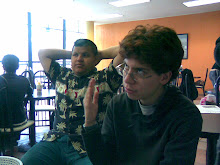
Sunday morning I saw the game Racing Lens v. Marseille. I have always loved French football, especially the Marseille style. The basics of that teams, as Guadalajara or Ajax, are completely unending. Players such as Mathieu Flamini and Samir Nasri, or players who now are stars in their teams (maturing from previous clubs) such as William Gallas or Didier Drogba, have passed through the process of Droi Au But. Gol TV commentators were discussing the labor of something I have already noticed long ago. It was a pretty common syndrome against over-talented players: desapearing in the pitch. It had happened to Zidane, to van der Vaart, to Robben, to Cruyff, even Pelé in his early and youthful days. It was appointed by Diego Valado and his partner Sunday morning, but it is an issue I will discuss, it is extent and even I suffered from it, before my injury.
The main topic was, before all, Marseille's elimination of UEFA Cup against the modest Zenit from Russia. The president of the French side was made some statements regarding the lack of effort by some players, two particularly. He did not mentioned any of these but it was clearly that the message was directed for the two most talented players, Nasri and Cissé.
Disappearing in the pitch is a phenomenon usually related with two things, mispositioning since the very basics of football learning or a complete lack of identity towards the position the player's playing.
The first has to do with the inability of making a good and solid performance at a required position. The absence of maneuvering, or the opposite when the player is always wanting the ball in an ubicous state (my case), is the first of a series of indications. After this, comes the inability of having a good play or to distribute the ball in the simplest of ways. Then the confusion of making a standout. Of course pitch conditions such as length(official or unofficial) and the context of the game (win, draw or loose) contribute to the confusion. The best example in this phase is Theo Walcott. Since his early days he has been playing on the wing, but in the U-23 England team his position was reorientated towards the forward. Mr. Wenger viewed his evident talent, and wanted to do the same that years ago functioned marvelously with the "Unnamble". This is a delicate point because it is just one conclusion. If the player is really talented his style will boost, as well as the confidence, but in the opposite the player will lost the guideline and eventually will enter the second phase.
This second phase is very difficult and when most of talented players loose reigns and became something different from what it was suppossed to happen. They either turn into a different position, not knowing clearly the pros and cons of each role. This as an example with Castroman's switch from defensive midfielder to striker. The fact that a good midfielder scores and provides chances and game to the team does not assure that, in case of becoming a forward, will earn an unseen array of goals. The opposite example could be Tomás Rosicky, which began in the position of Cesc in his Praga days, and evolved naturally towards an offensive midfielder, who provided opportunities, feeding forwards, the most close example of a link in Europe. In The Arsenal he has brought an immense array of attacking possibilities, reaching unimaginable possibilities of game play. The other point is the natural selection; the players miraculously enters a different position, not prestablished, and performs even better that in his previous position. A good example is Willy Sagnol (performing a Right Midfielder in a season) or Owen Hargreaves, the opposite of the "Unnamble" who was carried by his mentor.
Some may ask about Johan Cruyff. He was different is every sense of the word, so I will not mention him. He was a different player, from all the players, and from all the Legends.
How can a player can overcome this problem?
The first step is getting the right information on time and from a source completely aware of the growth of the player, both psychologically and sport. This can be the manager or an assistant , or the skipper. The accurate handling of information is crucial to the following step. The best example was Nasri's celebration towards the President, he made sure everybody that he is playing and not giving up. A little critic can be useful sometimes, to put the player back on earth. But this is tricky because it depends on the player, he can make what Nasri or can become an Adriano.
The second step getting over this problem is reached in a more mature state, when the player is fully conscious of his capabilities, disabilities, advantages etc. Of course this can be obtained younger, but it is mainly through a couple of seasons that players reach the state of autocritic. When this happen the player can soar up the level of a team, reaching his best and acquiring a good understanding of the game.
Then when a 'crack' or a 'legend' is born, different things happen. They can derive and make the match sway towards his favor. Very few talented and skilled players can become leaders: Zidane, Cruyff, Totti, Fachetti etc. But the Football personality that is inflicted towards a team with talent and command is something for other post.




No comments:
Post a Comment